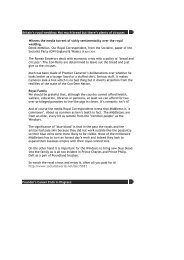New meanings of Panafricanism in the era of globalisation
New meanings of Panafricanism in the era of globalisation
New meanings of Panafricanism in the era of globalisation
You also want an ePaper? Increase the reach of your titles
YUMPU automatically turns print PDFs into web optimized ePapers that Google loves.
fact that – 40 years after <strong>the</strong> first wave <strong>of</strong> <strong>in</strong>dependence – <strong>the</strong>se are still <strong>the</strong> only<br />
languages <strong>of</strong> power <strong>in</strong> virtually all <strong>the</strong> countries <strong>of</strong> sub-Saharan Africa. For <strong>the</strong> vast<br />
majority <strong>of</strong> <strong>the</strong> urban and <strong>the</strong> rural poor, this means that <strong>the</strong> one skill <strong>the</strong>y possess <strong>in</strong> full<br />
measure is <strong>of</strong> no use to <strong>the</strong>m. Their marg<strong>in</strong>alisation and <strong>the</strong>ir alienation from <strong>the</strong> modern<br />
sector are re<strong>in</strong>forced because <strong>the</strong>y are not pr<strong>of</strong>icient <strong>in</strong> <strong>the</strong> foreign languages <strong>of</strong> <strong>the</strong><br />
erstwhile conquerors. As Ngugi wa Thiong’o (2003:10) puts it:<br />
Most governments tend to hide <strong>the</strong>ir heads <strong>in</strong> <strong>the</strong> sand and pretend<br />
that African languages do not exist or else try to force a retrograde<br />
policy <strong>of</strong> mono-l<strong>in</strong>gualism. Governments can help by policies that<br />
make African languages part <strong>of</strong> <strong>the</strong> languages <strong>of</strong> social mobility and<br />
power, currently a monopoly <strong>of</strong> European languages. But<br />
renaissance, as rebirth and flower<strong>in</strong>g, can only spr<strong>in</strong>g from <strong>the</strong><br />
wealth <strong>of</strong> imag<strong>in</strong>ation <strong>of</strong> <strong>the</strong> people, and above all, from its keepers<br />
<strong>of</strong> memory. …<br />
To move forward from here, and not only <strong>in</strong> <strong>the</strong> doma<strong>in</strong> <strong>of</strong> language policy, <strong>the</strong> African<br />
middle class, and <strong>the</strong> <strong>in</strong>telligentsia <strong>in</strong> particular, are called upon to do what Amilcar<br />
Cabral challenged <strong>the</strong>m to do more than 30 years ago, i.e., commit class suicide. But,<br />
this does not mean, as most <strong>of</strong> <strong>the</strong>m <strong>in</strong>st<strong>in</strong>ctively th<strong>in</strong>k, mov<strong>in</strong>g “upward” <strong>in</strong>to <strong>the</strong><br />
positions <strong>of</strong> <strong>the</strong> bourgeoisie. To do this, as so many have <strong>in</strong>deed done, is to consummate<br />
a “false decolonisation”. In <strong>the</strong> words <strong>of</strong> John Saul (2002:41), this amounts to<br />
… <strong>the</strong> ris<strong>in</strong>g African middle class, both entrepreneurial and<br />
political/bureaucratic <strong>in</strong> provenance, merely slid<strong>in</strong>g comfortably<br />
<strong>in</strong>to <strong>the</strong>ir political positions as … ‘<strong>in</strong>termediaries’ <strong>of</strong> global Empire<br />
and, from <strong>the</strong>ir heights, fend<strong>in</strong>g <strong>of</strong>f <strong>the</strong> claims <strong>of</strong> <strong>the</strong> povertystricken<br />
<strong>the</strong>y have left beh<strong>in</strong>d.<br />
Instead, a superlative act <strong>of</strong> <strong>the</strong> imag<strong>in</strong>ation is required by means <strong>of</strong> which <strong>the</strong>y can<br />
consistently and consequentially view <strong>the</strong> world from <strong>the</strong> angle <strong>of</strong> vision <strong>of</strong> <strong>the</strong> workers<br />
and peasants, who constitute <strong>the</strong> overwhelm<strong>in</strong>g majority <strong>of</strong> <strong>the</strong> people <strong>of</strong> <strong>the</strong> cont<strong>in</strong>ent.<br />
Africa will survive <strong>the</strong> <strong>era</strong> <strong>of</strong> <strong>globalisation</strong>. It will rise up and develop. Out <strong>of</strong> <strong>the</strong> very<br />
depths <strong>in</strong> which <strong>the</strong> cont<strong>in</strong>ent is trapped, visionary, imag<strong>in</strong>ative, passionate and<br />
committed leadership will be compelled to explore and eventually implement alternative<br />
approaches to economic and social organisation and behaviour. The portents <strong>of</strong> <strong>the</strong><br />
26
















